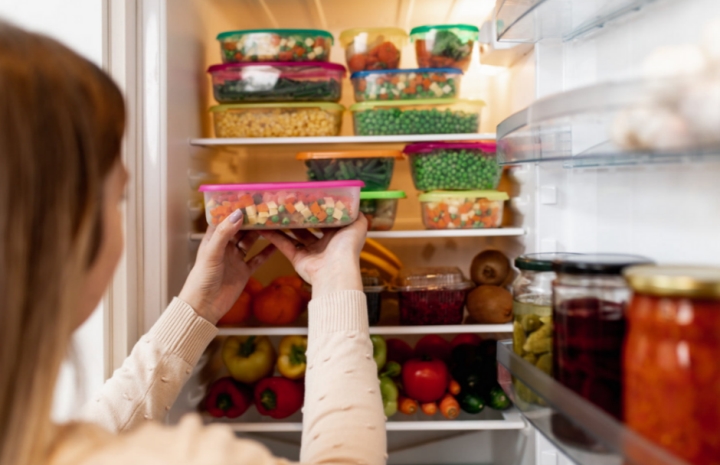Improper storage of leftover food can lead to food poisoning, digestive disorders, and potential health risks. To protect the health of your entire family, it’s important to remember the proper ways to safely store and handle leftover food.
Tips for Safe Food Storage
Store at the Right Temperature
Leftover food should be refrigerated at a temperature below 5°C and reheated to a minimum temperature of 60°C. Storing food at temperatures above 5°C or reheating leftovers at temperatures lower than 60°C can easily create conditions for bacteria to invade and multiply in the food.
Typically, the refrigerator’s cold compartment has an absolute temperature range of 0 to 3°C. However, with most refrigerators, the cold air flows from the inside out. Therefore, it’s important to note that food items that require long-term storage should be placed near the back of the refrigerator to maintain a stable level of coldness.

Safe storage and handling of leftover food
Frequently Clear the Refrigerator
Avoid overcrowding your refrigerator as sufficient space is needed for air circulation to help maintain the proper temperature and prevent food spoilage. Additionally, it’s important to minimize the placement of large containers inside the refrigerator as they can obstruct the airflow from the back to the outside.
You can utilize various types of woven baskets to neatly organize your items and ensure proper air circulation.
Refrigerate Food Promptly
Within 2 hours of cooking, leftover food should be promptly refrigerated to ensure freshness and safety.
For standard refrigerators, it’s not recommended to store eggs and milk on the door shelf as it doesn’t provide sufficient coldness and can cause spoilage. It’s best to place them in specialized containers and store them in a more stable and colder location within the refrigerator.
Storage Guidelines for Specific Foods
– Processed meats can be stored for 4-6 days in the refrigerator and 10 days in the freezer
– Fresh meats such as beef, chicken, and pork should be stored for a maximum of 1-2 days in the refrigerator
– Cooked rice should be refrigerated within 1 hour of cooking and should not be kept in the refrigerator for more than 6 days
– Roasted meats can be refrigerated for 3-5 days in the refrigerator
– Sausages can be refrigerated for 7 days if the package has been opened and 14 days if the package has not been opened
– Fruit juices can be refrigerated for 7-10 days in open containers and up to 3 weeks in unopened containers
– Depending on their freshness, bananas, apples, oranges, strawberries, etc. can be refrigerated for 2-3 days in the refrigerator
– Fresh produce should be prepared and consumed on the same day and can be stored in the refrigerator at 0-3°C without the need for freezing
Note: Nutrient-rich foods should not be stored in the refrigerator overnight, such as cooked vegetables, meat omelets, scrambled eggs with meat, crab soup, as they can produce harmful toxins for the body.

Use specialized, airtight glass containers to store your food.
To prevent odors and bacteria from forming in the refrigerator, remember:
– Raw fish and meat should be thoroughly cleaned and tightly packaged before storing in the freezer.
– Use specialized, airtight glass containers that do not produce odors. The transparency of the containers makes it easy to differentiate between different types of food.
– Store raw and cooked food separately to prevent cross-contamination.
– Clean and wipe down the refrigerator at least once a month.
Additional Notes for Refrigerated Food Storage:
– Food that has been taken out of the freezer should be used immediately.
– Newly frozen food should be placed inside the freezer. Older food items should be stored outside for easier access.
– It’s recommended to label food items with the date to avoid consuming expired food.
– Even though the food is stored inside the refrigerator, it should still be kept in separate, airtight containers.
– Certain foods like cheese and fish should be wrapped in aluminum foil.
Source: VTC.vn
Uncovering 10 Astonishing Methods to Neutralize Refrigerator Odors
 Refrigerator Odors’>
Refrigerator Odors’>Having a fresh-smelling refrigerator is essential, and Dien May GREEN has the answers to ensure this. In this article, you will find tips to help remove odors and steps to take to prevent unpleasant smells from taking over your refrigerator.
Ten Strategies to Streamline Your Cooking Process
Are you a busy housewife looking for ways to save time in the kitchen? Did you know that flossing can also help you out? Check out these 10 tips to help you quickly and easily prepare delicious meals for your family. Learn how to peel garlic in 10 seconds and cut cherry tomatoes quickly for a healthy and tasty meal.
4 Strategies for Storing Chili for One Month
Do you want to enjoy the fresh, spicy flavor of chili peppers all month long? Look no further! This article provides tips and tricks for storing chili peppers so that they stay fresh and flavorful for up to a month. Learn how to best preserve your peppers and savor their zesty taste for weeks to come.




































